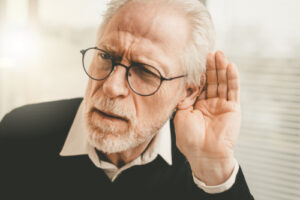Has it become harder to hear conversations around you? Do you find it more challenging to participate when others talk to you?
Hearing loss is common as you get older. As you age, parts of your inner ear begin to degenerate. When this degeneration occurs, it affects the cells that translate sound waves into electrical impulses sent to the brain.
The more cells that degenerate, the harder it is to hear because your ears can’t translate all the sound that passes into them into information your brain can understand. Because this process happens so slowly, it can be hard to tell when you start to lose your hearing.
You may also have hearing loss earlier in life than you may expect. Keep reading to discover why you could have hearing loss and not realize it!
Hearing Loss is More Common than You Think

According to the National Health and Nutrition Examination Survey, nearly one in four adults aged 65 to 74 and almost half of all adults aged 75 and older experience hearing loss. But while only around 2% of adults between the ages of 45 to 54 have hearing loss, that number quadruples to 8% for adults aged 55 to 64.
While it may be less common to have hearing loss before you turn 65, it’s still possible that it could happen. It’s imperative to have your hearing loss treated quickly, as auditory deprivation can permanently alter your brain function.
Untreated Hearing Loss
When you can’t hear well for an extended period, your brain goes through auditory deprivation. When deprived of one sense for an extended period, your brain will change how it functions.
This change in function means that your brain will start devoting more resources to other senses. The problem is that your brain has trouble readjusting again after that happens.
While you may get hearing aids to assist your hearing, they won’t work as well as they could because your brain has been understimulated by sound for too long. Hearing aids are most helpful when diagnosing hearing loss as early as possible to begin treatment.
Degeneration of the inner ear cannot be stopped or reversed, but hearing aids assist your inner ear’s function if your brain hasn’t been understimulated for too long. This is why it’s crucial to recognize when you have trouble hearing.
However, not everyone with hearing loss may realize they are experiencing it. Here are some of the signs that you may have hearing loss:
TV Volume

Do you have to turn up the volume on your TV as high as it can to hear it? Having your volume turned up is a sign that you don’t hear well.
Everyone’s TV is different, with unique volume ranges and controls, meaning it may be hard to tell what “too high” is. A good indicator that it’s very high is if when other people watch TV with you, they complain that it’s too loud.
If it’s always at the highest setting, that’s also a sign that it’s far too loud. If you can only hear something at top volume, that could indicate a hearing problem!
Asking Others to Repeat Themselves
When conversing with someone, do you need to ask them to repeat themselves often? If so, that could signal you’re having trouble hearing.
It can be hard to tell if it only happens with one or two people, but it’s a sign of potential hearing loss when you consistently say “what” after someone asks you a question.
Group Conversations

If you can hear when you’re talking to someone one-on-one but struggle with group conversations, that can also be a sign of hearing loss. When you’re talking to several people, is it challenging to follow conversations between other people?
When people are speaking in multiple spots around you, it can challenge your hearing. If you have hearing loss, it tends to be more apparent when you’re talking to people in a group, so it’s something to watch out for.
Lip Reading
A lot of times, people with hearing loss will unconsciously read lips. You may be doing it and not even realize it.
But if you struggle to understand someone when you can’t see their lips, that can be a sign that you have hearing loss. It is easier to understand people when you can see their lips moving even if you have healthy hearing, so this isn’t a hard and fast rule, but it’s something to keep in mind.
If there’s a big difference in how well you can hear someone when you can’t see their lips moving, it could be because you have hearing loss.
Social Isolation

Because being social and talking in groups of people can be difficult if you have hearing loss, many people who experience hearing loss don’t go out and socialize as much. You may be socially isolating yourself more and not even know why.
You may find that you stay home more than you used to or feel isolated. But if you think about why you no longer want to go out and see friends, is the reason that you find group conversations difficult?
Is it because you’re constantly embarrassed to ask people to repeat themselves? If so, you may be isolating yourself because of your hearing loss!
We Can Help

Don’t let hearing loss dictate what you can and can’t do. Come to St. Luke’s Cataract & Laser Institute to get help with your hearing.
In addition to vision care, we offer hearing care, which includes hearing testing and prescription hearing aids. Don’t wait until it’s too late. Schedule your appointment today at St. Luke’s Cataract & Laser Institute in Clearwater, FL, and take the first step in getting your hearing back!








